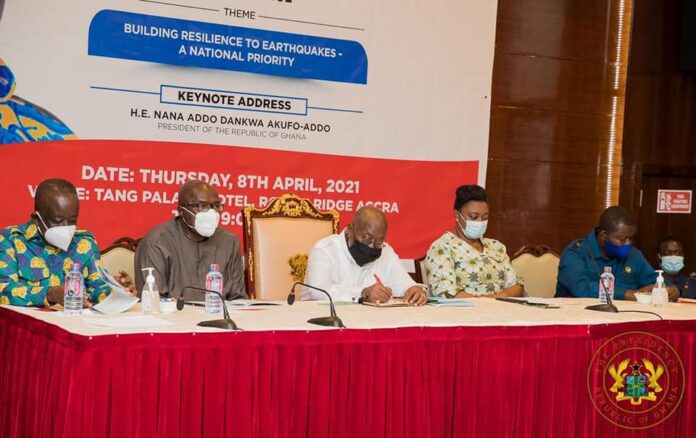
President Akufo-Addo has charged the engineering department of the Ministry of Works and Housing, to conduct a comprehensive assessment on all public buildings and structures to ascertain their earthquake resistance readiness and to advise government appropriately.
Addressing a stakeholders conference to discuss the report of the National Committee for Earthquakes on Ghana’s earthquake preparedness and response under the theme; “Building Resilience to Earthquakes; A National Priority”, President Akufo-Addo said the history of earthquakes in Ghana and recent earth tremors require a proactive approach to dealing with the possible impact and likely fatalities that may occur should an earthquake take place in the country.
“We in Ghana have also recorded earthquakes in the past. Indeed, our first earthquake on record is said to have occurred in 1615 and since then, other recorded earthquakes have also taken place. In 1636, an earthquake shook parts of the Western Region burying alive a number of people, particularly miners in the Nzema area. The last destructive earthquake occurred at 7:20 pm on 22nd June 1939 and measured 6.5 on the Richter scale. It claimed seventeen (17) lives, injured 133 people and razed several buildings down and led to the resettlement of several hundreds in new estates in Korle Gonno, Mamprobi and Chokor ” President Akufo-Addo stated.
Urgent Need for Earthquake Preparedness
President Akufo-Addo noted that at the time of the last major earthquake event, the population of Accra had been 177,000 persons. With the current estimated population of the Greater Accra Region conservatively being some 5 million persons, the President said remarked, “Your guess is good as mine with respect to the number of fatalities, were a similar event to occur today.”
“Constructing well engineered structures including dams and roads, and retrofitting important public lifeline buildings such as hospitals, schools, churches and mosques cannot be compromised. That is why I urged the Engineering Department of the Ministry of Works and Housing to ensure that a comprehensive integrity audit of all public buildings and structures is conducted and government appropriately advised,” President Akufo-Addo further stated.
Chairperson of the TCE
Chairperson of the Technical Committee on Earthquakes, Ing. Mrs. Carlien Bou-Chedid, in a brief statement indicated that after Ghana experienced four (4) minor earthquakes which created concern amongst the population, the Minister of the Interior, Hon. Ambrose Dery, on March 12, 2019, inaugurated a ten (10) member committee to examine the issues and draw up a framework for refocusing Ghana’s earthquake preparedness and response.
In undertaking the exercise, the committee was specifically tasked to identify and outline the key measures that must be undertaken by relevant agencies to empower the country’s communities to be well prepared and resilient for the reduction of seismic risk, outline other response measures required by stakeholders/agencies in the event of an earthquake, to include the recovery phase, evaluate the capacities of relevant bodies mandated with national response to identify resource gaps and recommend measures to augment their capabilities towards effective response and to determine the kind of international support that may be required.
This the Chairperson says has been done and members of the committee are delighted to subject their findings to scrutiny by all stakeholders in order to fine-tune same for implementation.
National Committee on Earthquakes
More than 80 years have passed since the last major earthquake in Ghana, that is, the Accra earthquake of 1939. Understandably, earthquake preparedness has not been at the forefront of disaster preparedness efforts such as events like flooding that occur almost annually, and have thus taken up the attention of authorities.
Earthquakes however, can have far more devastating consequences. The report from the National Committee on Earthquakes proposes measures to enable Ghana develop the capacity to cope with and recover from the effects of a major earthquake. The report gives consideration to ensuring that these measures neither compromise the ability of the country to develop nor place undue financial burden on individuals or the state.
Members of the committee include Eric Nana Agyemang-Prempeh, Director General of the National Disaster Management Organisation; Joseph Ofei Ankrah – Member, National Disaster Management Organisation; Nicholas Opoku, Ghana Geological Survey Authority; Benedict Arkhurst, Land Use and Spatial Planning Authority, and Dr. Lawrence Ofori-Boadu, Ghana Health Service. The rest are Prof. Ahmed Nuhu Zakaria, Ghana Ambulance Service; DCFO Julius Kuunuor, Ghana National Fire Service; DCOP George Tweneboah, Ghana Police Service; Ernest Kusi-Duah – Co-opted Member, National Disaster Management Organisation and Col. M. Mustapha, Ghana Armed Forces, who doubles as the Secretary to the committee.

